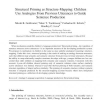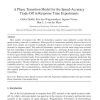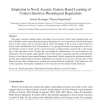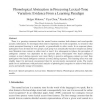COGSCI
2011
14 years 5 months ago
2011
The psycholinguistic literature has identified two syntactic adaptation effects in language production: rapidly decaying short-term priming and long-lasting adaptation. To explai...
111
click to vote
COGSCI
2011
14 years 5 months ago
2011
What mechanisms underlie children’s language production? Structural priming—the repetition of sentence structure across utterances—is an important measure of the developing ...
COGSCI
2011
14 years 9 months ago
2011
COGSCI
2011
14 years 9 months ago
2011
This article examines cognitive process models of human sentence comprehension based on the idea of informed search. These models are rational in the sense that they strive to qui...
COGSCI
2011
14 years 9 months ago
2011
Sound symbolism is the non-arbitrary link between the sound of a word and its meaning. Imai et al. (2008) showed that Japanese speaking children benefited from the presence of sou...
114
click to vote
COGSCI
2011
14 years 9 months ago
2011
Many kinds of creativity result from combination of mental representations. This paper provides a computational account of how creative thinking can arise from combining neural pa...
COGSCI
2011
14 years 9 months ago
2011
Most models of response time (RT) in elementary cognitive tasks implicitly assume that the speed-accuracy trade-off is continuous: When payoffs or instructions gradually increase ...
COGSCI
2011
14 years 9 months ago
2011
This paper examines whether adults can adapt to novel accents of their native language that contain unfamiliar context-dependent phonological alternations. In two experiments, Fre...
COGSCI
2011
14 years 9 months ago
2011
Previous research on lexical development has aimed to identify the factors that enable accurate initial word-referent mappings based on the assumption that the accuracy of initial...
COGSCI
2011
14 years 9 months ago
2011




